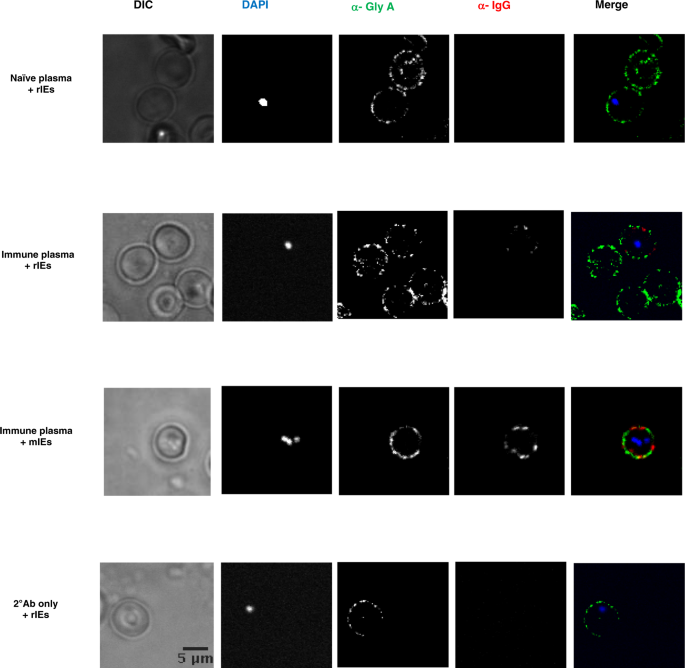2024-07-30 インペリアル・カレッジ・ロンドン(ICL)
<関連情報>
- https://www.imperial.ac.uk/news/255120/route-more-effective-malaria-vaccines-revealed/
- https://www.nature.com/articles/s41467-022-31640-6
- https://www.cell.com/immunity/fulltext/S1074-7613(24)00233-4
- https://www.life-science-alliance.org/content/7/8/e202301910
マラリア原虫のリングステージ寄生体の貪食はマラリアに対する防御を予測する Phagocytosis of Plasmodium falciparum ring-stage parasites predicts protection against malaria
Fauzia K. Musasia,Irene N. Nkumama,Roland Frank,Victor Kipkemboi,Martin Schneider,Kennedy Mwai,Dennis O. Odera,Micha Rosenkranz,Kristin Fürle,Domitila Kimani,James Tuju,Patricia Njuguna,Mainga Hamaluba,Melissa C. Kapulu,Hedda Wardemann,CHMI-SIKA Study Team & Faith H. A. Osier
Nature Communications Published:14 July 2022
DOI:https://doi.org/10.1038/s41467-022-31640-6

Abstract
Ring-infected erythrocytes are the predominant asexual stage in the peripheral circulation but are rarely investigated in the context of acquired immunity against Plasmodium falciparum malaria. Here we compare antibody-dependent phagocytosis of ring-infected parasite cultures in samples from a controlled human malaria infection (CHMI) study (NCT02739763). Protected volunteers did not develop clinical symptoms, maintained parasitaemia below a predefined threshold of 500 parasites/μl and were not treated until the end of the study. Antibody-dependent phagocytosis of both ring-infected and uninfected erythrocytes from parasite cultures was strongly correlated with protection. A surface proteomic analysis revealed the presence of merozoite proteins including erythrocyte binding antigen-175 and -140 on ring-infected and uninfected erythrocytes, providing an additional antibody-mediated protective mechanism for their activity beyond invasion-inhibition. Competition phagocytosis assays support the hypothesis that merozoite antigens are the key mediators of this functional activity. Targeting ring-stage parasites may contribute to the control of parasitaemia and prevention of clinical malaria.
Fcを介したエフェクター機能の広がりは、ヒトマラリア挑戦後の臨床免疫と相関する Breadth of Fc-mediated effector function correlates with clinical immunity following human malaria challenge
Irene N. Nkumama,Rodney Ogwang,Dennis Odera,…,Roland Frank,CHMI-SIKA study team ,Faith H.A. Osier
Immunity Published:May 23, 2024
DOI:https://doi.org/10.1016/j.immuni.2024.05.001
Highlights
- Used a human malaria infection study to investigate functional correlates of immunity
- IgG Fc-dependent mechanisms are correlated with acquired immunity, but GIA is not
- The breadth of IgG Fc-effector function is associated with protective immunity
Summary
Malaria is a life-threatening disease of global health importance, particularly in sub-Saharan Africa. The growth inhibition assay (GIA) is routinely used to evaluate, prioritize, and quantify the efficacy of malaria blood-stage vaccine candidates but does not reliably predict either naturally acquired or vaccine-induced protection. Controlled human malaria challenge studies in semi-immune volunteers provide an unparalleled opportunity to robustly identify mechanistic correlates of protection. We leveraged this platform to undertake a head-to-head comparison of seven functional antibody assays that are relevant to immunity against the erythrocytic merozoite stage of Plasmodium falciparum. Fc-mediated effector functions were strongly associated with protection from clinical symptoms of malaria and exponential parasite multiplication, while the gold standard GIA was not. The breadth of Fc-mediated effector function discriminated clinical immunity following the challenge. These findings present a shift in the understanding of the mechanisms that underpin immunity to malaria and have important implications for vaccine development.
Graphical abstract

マラリア感染制御後の防御免疫の主要な標的は全長MSP1である Full-length MSP1 is a major target of protective immunity after controlled human malaria infection
Micha Rosenkranz, Irene N Nkumama, Rodney Ogwang, Sara Kraker, Marie Blickling, Kennedy Mwai, Dennis Odera, James Tuju, Kristin Fürle, Roland Frank, Emily Chepsat, Melissa C Kapulu, CHMI-SIKA Study Team, Faith HA Osier
Life Science Alliance Published 20 May 2024
DOI: 10.26508/lsa.202301910

Abstract
The merozoite surface protein 1 (MSP1) is the most abundant protein on the surface of the invasive merozoite stages of Plasmodium falciparum and has long been considered a key target of protective immunity. We used samples from a single controlled human malaria challenge study to test whether the full-length version of MSP1 (MSP1FL) induced antibodies that mediated Fc-IgG functional activity in five independent assays. We found that anti-MSP1FL antibodies induced complement fixation via C1q, monocyte-mediated phagocytosis, neutrophil respiratory burst, and natural killer cell degranulation as well as IFNγ production. Activity in each of these assays was strongly associated with protection. The breadth of MSP1-specific Fc-mediated effector functions was more strongly associated with protection than the individual measures and closely mirrored what we have previously reported using the same assays against merozoites. Our findings suggest that MSP1FL is an important target of functional antibodies that contribute to a protective immune response against malaria.

